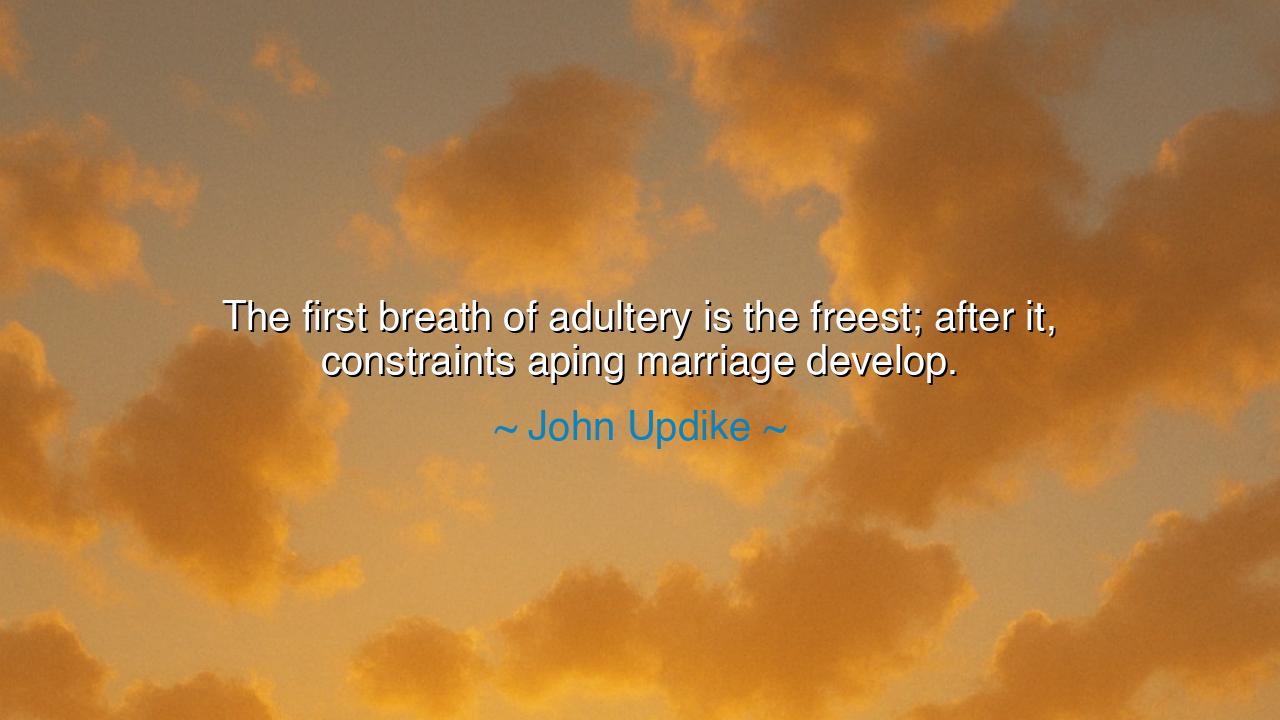
The first breath of adultery is the freest; after it, constraints
The first breath of adultery is the freest; after it, constraints aping marriage develop.






In the haunting and perceptive words of John Updike, the modern chronicler of human desire and moral entanglement, we find a truth as ancient as passion itself: “The first breath of adultery is the freest; after it, constraints aping marriage develop.” These words, though born from the pen of a novelist, ring with the gravity of a philosopher’s insight. They speak to the fleeting illusion of forbidden freedom, the intoxicating moment when rebellion feels divine—before it hardens into the same chains it sought to escape. Adultery, in this sense, is not merely the breaking of vows, but the human attempt to flee from confinement into ecstasy, only to find that even in escape, one cannot escape the laws of the heart.
The origin of this quote lies in Updike’s lifelong exploration of love, sin, and the contradictions of the human spirit. His novels—especially Couples and Marry Me—are filled with characters who chase passion as if it were salvation, only to discover it becomes another kind of imprisonment. Updike himself, a man of deep religious and artistic tension, wrote about adultery not to condemn, but to understand. He saw in it the tragic cycle of human yearning: the soul’s rebellion against routine, and its simultaneous need for structure and belonging. Thus, when he speaks of “constraints aping marriage,” he reveals the irony that every act of liberation eventually invents its own form of bondage.
The ancients knew this well. In the myths of Greece and Rome, Eros and Aphrodite are not gentle gods—they are forces of chaos, both divine and destructive. Consider the story of Paris and Helen, whose stolen love ignited the Trojan War. Their first meeting, like the “first breath of adultery,” was filled with wild freedom—a moment of beauty unchained by duty. Yet soon their passion birthed war, death, and ruin. What began as liberation became enslavement to consequence. Updike’s words echo across the centuries: every act that defies the sacred order, if not born from truth, will build its own prison from the ashes of its rebellion.
That “first breath”, as Updike calls it, is the moment when desire feels pure—when it carries no guilt, no history, no weight. It is the illusion of total freedom, the sense of being alive beyond morality or expectation. Yet even as it begins, the threads of obligation begin to weave again. Lies must be told, meetings must be arranged, promises whispered in the dark must be kept. What was once spontaneous begins to take shape, to organize itself into a counterfeit version of what it rejected. Thus, adultery, like all acts born from deception, eventually mimics the very structure it sought to defy—rules, expectations, dependence. The freedom of the first breath gives way to the suffocation of concealment.
Consider, too, the life of Anne Boleyn, whose affair with King Henry VIII began as defiance and passion. For her, it was the breath of rebellion against the order of kings and queens, a love that promised liberation and power. Yet once she became queen, the same passion that had lifted her became her downfall. Henry’s love turned cold, her freedom vanished, and the constraints of her new “marriage” ended in her death. The freest moment of her love was its beginning; afterward, her life became a mirror of what she had once overthrown. Thus history repeats the wisdom of Updike’s warning: that the heart’s pursuit of forbidden joy can transform into the very sorrow it tried to escape.
The deeper meaning of Updike’s insight lies not in the moral condemnation of adultery, but in his understanding of human nature. He shows us that freedom without truth is fragile, that ecstasy without integrity soon curdles into imitation. The human soul, though it longs for liberation, also craves order. When we attempt to find freedom through deception, we do not find liberation; we merely build a new cage, disguised as pleasure. True freedom is not the breaking of vows, but the alignment of desire with honesty. The spirit that lies cannot breathe for long—it suffocates on its own contradictions.
So let this lesson be carried forward as ancient wisdom reborn: beware the freedom that begins in secrecy, for it is often the beginning of a subtler servitude. If you long to feel alive, seek truth, not illusion. If you crave connection, build it in the open, not in the shadows. The first breath of passion may thrill, but the deeper breath of integrity sustains. Love that endures must be founded not on escape, but on understanding.
Thus, the teaching of John Updike stands among the timeless lessons of the soul: that every false freedom becomes its own captivity, and every act born of deceit binds the spirit to its own undoing. To live truly free is not to chase the first breath of rebellion, but to walk steadfastly in the air of truth—where love, even when tested, breathes without shame.






AAdministratorAdministrator
Welcome, honored guests. Please leave a comment, we will respond soon